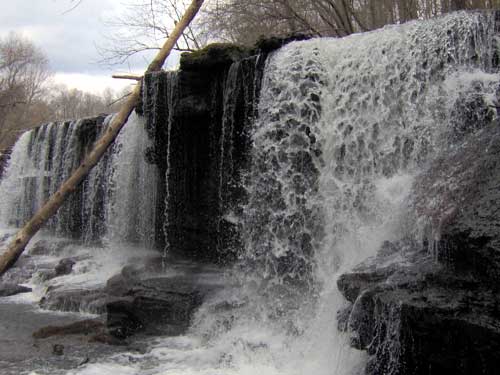 by PRESTON MACDOUGALL April 27, 2010
The February issue of National Geographic magazine features a spotlight on the Duck River, which flows through the rocky and rolling Central Basin of Middle Tennessee - at a speed that I have found quite suitable for canoes, which is how I imagine photographer David Liittschwager navigated the Duck.  Credit: Brian Stansberry.
To capture freshwater life, Liittschwager photographed numerous varieties of insect nymphs, turtles, mussels, snails, fish and other aquatic friends that lived in, or wandered in an out of one cubic foot at his survey site at the Lillard Mill on the Duck River. This bright green international spotlight on Middle Tennessee put conservation-minded folks around here in a great mood for the 40th Earth Day celebration on April 22. One Earth Day Eve party was held at the Loveless Café on the outskirts of Nashville. The Tennessee Chapter of The Nature Conservancy invited friends of both the natural and musical environments of Tennessee to a special performance of Music City Roots, Live from the Loveless Café. It was a barnstormer! I imagine that the enjoyment of the crowd listening to the diversity of sounds and acoustic styles heard in the Loveless Barn was similar to the enjoyment that Liittschwager and his crew must have felt as they photographed one beautiful critter after another. The celebration of Tennessee's musical roots started appropriately with the lyrical story-telling of Minton Sparks, and moved up-tempo quickly to the Delta blues as presented by David Jacobs-Strain, a newcomer to the Nashville scene. Traditional sounds were harmoniously represented by Barry and Holly Tashian, who have taken their Louvin brothers-inspired folk music to as many far-flung places as Liittschwager took his camera. Two generations of Southern singer songwriters were joyfully represented by Marshall Chapman and Tommy Womack. It was a great night to be in Middle Tennessee! Thinking about the conservation of nature, while simultaneously contemplating the roots of American music, naturally got me thinking about jazz. Picture this sound:
What did you think of? That was my imitation of an elephant, one of the many sound effects that I used to entertain my children with on long car trips. It's clear why biologists refer to this elephant call as a trumpet. When I hear Duke Ellington "Take the A Train", I can see him taking it too. To my ear, jazz music is both an ingenious art form and a form of sound conservancy. It's also fun to listen to, and there's not a better or more convenient place to listen to jazz music than on 89.5 MHz on your FM dial. Jazz89 can also be streamed form wmot.org to your laptop or your smart phone - for free! Well, almost for free. I didn't have to pay an entrance fee when I slipped my canoe into the Duck River, but I was happy to pay to join the Tennessee Chapter of The Nature Conservancy. Likewise, I don't have to feed my computer quarters when I listen to WMOT online, but I am happy to include it among my automatic payroll deductions. Diversity is just as important to airwaves as it is to flora and fauna.
E-mail your letters & opinions to editor@sitnews.us SitNews ©2008 Stories In The News Ketchikan, Alaska |
||